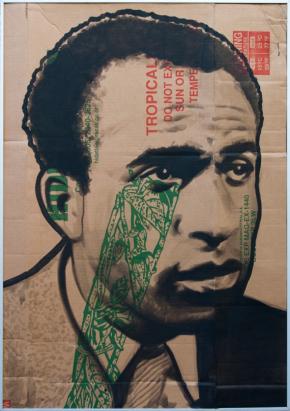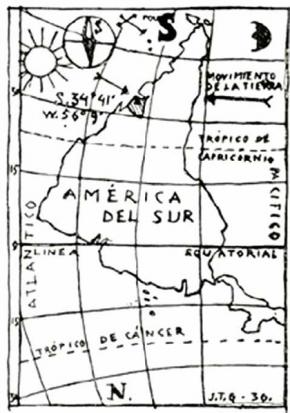Decolonising the curriculum in SOAS, World Philosophies
Those of us teaching on the SOAS BA World Philosophies programme welcome the recent press interest in the debates concerning ‘decolonising the curriculum’. These debates challenge both students and staff to think critically about the contexts and purposes of the production of knowledge and its institutional dissemination. However, given the inaccuracy of some media reports, it is important that we clarify that there is no question of ‘white philosophers’ being removed from the curriculum at SOAS; Plato and Kant will remain at the table. Yet beside them, now, thinkers from the rich and longstanding non-Western philosophical traditions of Asia and Africa are taking their rightful places.
 Franz Fanon, Xavier CélanieWe begin with a pointed question: given Kant’s dictum ‘dare to know’, why have these philosophical traditions been routinely excluded from mainstream philosophy curricula in the UK and elsewhere in Europe and the United States? It is a lacuna in many philosophy programmes that students do not learn about Arabic philosophers such as al-Fārābī, Avicenna and Averroes who, apart from their major contributions within their own immediate intellectual contexts, also had a significant impact on the Western natural philosophy, metaphysics, logic and ethics. Even more rarely do students learn of such thinkers as the Buddhist Nāgārjuna (2nd century CE), whose analysis has points of contact with contemporary debates concerning the nature of causality and relativity in speculative and critical realisms, or the Indian logicians Diṅnaga (5-6th century CE), Uddyotakāra (6th century CE), and Gaṅgeśa (c. 12th century CE), who along with many others developed a system of Indian logic to be set beside those not only of Aristotle or the Stoics, but of Frege and Russell. Similarly, the deep philosophical thought developed over the course of thousands of years in China can go without a mention in many a Western Philosophy curriculum. Philosophy students should be encouraged to engage with the challenging work of thinkers like Kwami Anthony Appiah, Franz Fanon, Achille Mbembe, Valentin-Yves Mudimbe, Enrique Dussell and Walter Mignolo just as they do with Parfit and Strawson. Should we not all be in the business of engaging, to quote Nietzsche, with ‘what may be thought against our thought’?
Franz Fanon, Xavier CélanieWe begin with a pointed question: given Kant’s dictum ‘dare to know’, why have these philosophical traditions been routinely excluded from mainstream philosophy curricula in the UK and elsewhere in Europe and the United States? It is a lacuna in many philosophy programmes that students do not learn about Arabic philosophers such as al-Fārābī, Avicenna and Averroes who, apart from their major contributions within their own immediate intellectual contexts, also had a significant impact on the Western natural philosophy, metaphysics, logic and ethics. Even more rarely do students learn of such thinkers as the Buddhist Nāgārjuna (2nd century CE), whose analysis has points of contact with contemporary debates concerning the nature of causality and relativity in speculative and critical realisms, or the Indian logicians Diṅnaga (5-6th century CE), Uddyotakāra (6th century CE), and Gaṅgeśa (c. 12th century CE), who along with many others developed a system of Indian logic to be set beside those not only of Aristotle or the Stoics, but of Frege and Russell. Similarly, the deep philosophical thought developed over the course of thousands of years in China can go without a mention in many a Western Philosophy curriculum. Philosophy students should be encouraged to engage with the challenging work of thinkers like Kwami Anthony Appiah, Franz Fanon, Achille Mbembe, Valentin-Yves Mudimbe, Enrique Dussell and Walter Mignolo just as they do with Parfit and Strawson. Should we not all be in the business of engaging, to quote Nietzsche, with ‘what may be thought against our thought’?
 Franz Fanon, Xavier CélanieIt is not merely that students should be exposed to non-Western philosophical traditions. Any critical thinker will want to ask how it could be that the great European philosophers of the Enlightenment could write so profoundly about the liberating potential of knowledge, could hail the slogan of the French Revolution, Liberté, égalité, fraternité, at the very same moment that Europe was colonising much of the globe and participating in the slave trade. Yet decolonising Philosophy is not simply a matter of critique. We mustn’t get stuck there. As we see it, decolonisation is fundamentally about the practice of dialogue; it is a working towards what Hans-Georg Gadamer called ‘the fusion of horizons’ by which understanding across boundaries becomes possible.
Franz Fanon, Xavier CélanieIt is not merely that students should be exposed to non-Western philosophical traditions. Any critical thinker will want to ask how it could be that the great European philosophers of the Enlightenment could write so profoundly about the liberating potential of knowledge, could hail the slogan of the French Revolution, Liberté, égalité, fraternité, at the very same moment that Europe was colonising much of the globe and participating in the slave trade. Yet decolonising Philosophy is not simply a matter of critique. We mustn’t get stuck there. As we see it, decolonisation is fundamentally about the practice of dialogue; it is a working towards what Hans-Georg Gadamer called ‘the fusion of horizons’ by which understanding across boundaries becomes possible.
 Jaoquín Torres-García,Inverted map of America, 1936.BA World Philosophies at SOAS is a unique programme that has been developed to promote philosophical dialogue between ‘East’ and ‘West’. Our students are exposed to both European and non-European intellectual systems, engaging with Kant and Confucius, Aquinas and Appiah and building dialogues between diverse wisdom traditions. The intellectual focus of the degree is on ensuring that our students examine philosophy and philosophical questions in a critical and inclusive way. Our students are given a rare opportunity to become conversant with the systems of epistemology, logic, metaphysics and ethics of a wider range of societies and historical contexts than those of the traditional philosophy graduate. Not only do we have a range of unparalleled expertise in the philosophical traditions of Asia, Africa, and the Middle East, SOAS offers a strong programme of teaching in this regard by lecturers as conversant in the Western canon as they are in their regional fields of expertise. Indeed, the core syllabus is devoted to identifying points of contact between disparate philosophical traditions — European, Anglophone, and non-European — organised around core philosophical questions, concepts, and approaches in logic, metaphysics, hermeneutics, semantics, and ethics.
Jaoquín Torres-García,Inverted map of America, 1936.BA World Philosophies at SOAS is a unique programme that has been developed to promote philosophical dialogue between ‘East’ and ‘West’. Our students are exposed to both European and non-European intellectual systems, engaging with Kant and Confucius, Aquinas and Appiah and building dialogues between diverse wisdom traditions. The intellectual focus of the degree is on ensuring that our students examine philosophy and philosophical questions in a critical and inclusive way. Our students are given a rare opportunity to become conversant with the systems of epistemology, logic, metaphysics and ethics of a wider range of societies and historical contexts than those of the traditional philosophy graduate. Not only do we have a range of unparalleled expertise in the philosophical traditions of Asia, Africa, and the Middle East, SOAS offers a strong programme of teaching in this regard by lecturers as conversant in the Western canon as they are in their regional fields of expertise. Indeed, the core syllabus is devoted to identifying points of contact between disparate philosophical traditions — European, Anglophone, and non-European — organised around core philosophical questions, concepts, and approaches in logic, metaphysics, hermeneutics, semantics, and ethics.
In short, we who have developed the BA World Philosophies at SOAS reject the implication made recently by some that it is populist or faddish to develop curricula that are global in outlook, dialogic in nature, and fully and rigorously engaged in questions concerning the politics of knowledge. Rather, we consider it a matter of utmost intellectual integrity to insist on reading together philosophies ‘East’ and West’, and a moral imperative to facilitate free and vigorous dialogue between anyone who wishes to participate.
Our response to various media reports about philosophy at SOAS: On the question of ‘Decolonising the Curriculum at SOAS’:
A response by the instructors of the BA World Philosophies programme to recent press coverage